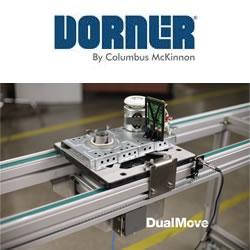The Story Behind Genesis and Wyzo
Automated food packaging lines are found in every segment of the food packaging industry. There are robotic solutions for every type of task, from simple pick and place to complex operations such as sealing cans or making pouches. Industry needs to be able to respond quickly to the ever-changing demands of today’s consumer.
The Current State of the Industry
Automated food packaging lines are found in every segment of the food packaging industry. There are robotic solutions for every type of task, from simple pick and place to complex operations such as sealing cans or making pouches. Industry needs to be able to respond quickly to the ever-changing demands of today's consumer.
The Future of Packaging
Packaging must keep up with customers' requirements. The emphasis is no longer on mass production, but on mass customization. This means that packaging equipment needs to be programmed to switch quickly and often. From increasing speed, to making customers feel more in control of their choices, automation technology is constantly evolving in line with packaging trends1. Industry needs new solutions that deliver productivity, flexibility, and safety.
Barriers such as still using gearbox servo motors that pose oil leak contamination risks that can't be properly washed down as food handling standards require. The performance of servo motors also force binary motion profile choices. They are either slow for safe collaborative robotic processes, or faster but in a non-collaborative environment. In this situation, delta robot OEMs are looking for new hardware to solve these problems. One specific area essential to food handling applications is a primary axis motor with higher torque to inertia, torque to mass/volume, within an IP67* package.
Our Solution
LDD direct drive motors create opportunities for robot designers to improve performance in highly dynamic applications. The engineers at Genesis developed a new methodology for detecting impact at high-speed and stopping instantaneously without the use of special sensors.
Frank Souyris, CEO of the start-up company Wyzo, saw its potential. "This technology is a game-changer that allows us to achieve a high level of performance and safety. We've been searching for a solution for over a decade, and LiveDrive is the missing link for our products." Wyzo is a unit of Demaurex SA, a pioneer in delta robots since 1987.
Frank Souyris CEO of Wyzo
In August of 2019, Demaurex SA and Genesis Motion Solutions signed a joint development agreement to integrate Genesis' LDD direct drive motors into Demaurex's latest-generation of Delta Robot Systems2.
In June of 2021, an entirely new class of industrial robot was launched. A collaborative robot3 called the Wyzo. It is the world's first high-speed pick-and-place "sidebot". It's compact, agile, and able to work side-by-side with humans. There are no protective barriers and it has uncompromised performance. This new class of robot would not be possible without the technology invented by Genesis.
The LDD series motor, enables Wyzo to comply with international safety standards, ISO/TS 15066 Collaborative Robot Technical Specification4 , which allows for human-machine collaboration. The world's first robot that is both high-speed, and safe to use around people.
"Wyzo constantly monitors its surroundings for the presence of human activity, allowing it to maximize performance when on its own, and [sic] to slow to a safe operating speed when a human is nearby. As a result, compared to cobots (collaborative robots), which are also used in the pharmaceutical industry, Wyzo offers higher speeds when operators are nearby (30 to 50 cycles per minute versus around 10 cycles per minute for cobots) and significantly higher speeds when operators are not detected (up to 80 cycles per minute)," says Souyris5.
Of the collaboration which enabled the Wyzo Souyris says, "It is a new benchmark for collaborative production that combines the best of human and machine abilities."
Genesis strives to create value with engineered solutions based on our customer's unique needs. LiveDrive LDD has enabled a new freedom for engineers to innovate and design robots without previous limitations of legacy hardware. Our team can work with you to create custom solutions for your application.
*IP67 represents one of the highest levels of ingress protection offered by an IP rating. This rating provides: Complete protection against ingress of dust and airborne particles. Protection against water and liquids, up to and including immersion in up to one meter of water.
Sources
What is the Future of Packaging Automation, from Packaging Strategies emagazine, September 20, 2021.
In 1988, DEMAUREX SA shifted its business focus to the food industry (demaurex.com). The Delta robot is now an industry standard for many companies within food and beverage, electrical and electronics, and pharmaceuticals industries. The Delta robot is considered the benchmark for best practice in terms of high-speed pick-and-place technology.
A cobot, or collaborative robot, and now "sidebot" are tools to support employees in their work, relieving them of many heavy, unergonomic and tedious tasks. They are designed for direct human robot interaction within a shared space.
ISO/TS 15066:2016, Robots and robotic devices — Collaborative robots, International Organization of Standardization (ISO) .
The Future of Packaging Automation, from Pharmaceutical Processing World, July 2, 2021.
Featured Product

DualMove Pallet System Utilizes Timing Belt for Precise Robotic Integration
Our highly advanced DualMove Pallet System for assembly automation is ideal for increasing the efficiency, generation, and precision of pallet traffic. Additionally, it reduces downtime costs that could disrupt production. DualMove is designed to work with the precision timing that robotic integration requires to be successful.
